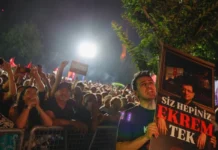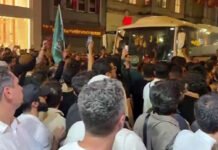Turkey has issued detention warrants for 35 more journalists over the alleged use of a smart phone application known as ByLock, the Cumhuriyet daily reported on Thursday.
According to the report, as part of an investigation run by the İstanbul Chief Prosecutor’s Office, Turkish police launched operations against suspects on Thursday morning and detained nine journalists, who are accused of membership in the faith-based Gülen movement due to using the ByLock app.
The editor of the Birgün daily, Burak Ekici, announced on social media that he had been detained by the police, who seized his mobile phone and laptop. Other detained journalists are Muhsin Pilgir (reporter for the closed Zaman daily and Cihan news agency), Ömer Faruk Aydemir (regional director of the İhlas news agency), Sait Gürkan Tuzlu (reporter for Cihan), Cüneyt Seza Özkan (production manager for the closed Samanyolu TV station), Yusuf Duran, Ahmet Feyzullah Özyurt, Ahmet Sağırlı (former columnist for the Türkiye daily) and Mutlu Özay (reporter for Cihan).
The Organization for Security and Co-operation in Europe (OSCE) Representative on Freedom of the Media Harlem Désir expressed deep concern on regarding the issuance of arrest warrants for 35 journalists and called on Turkish government to release nine journalists who were detained inİstanbul on Thursday.
In a statement on Thursday, Désir described Thursday’s media crackdown in Turkey “another baseless attack against journalists in Turkey” and said it exemplifies the alarming media freedom situation in the country.
“Countries committed to democratic principles must protect the freedom of speech and expression as a cornerstone of society. Authorities that act to undermine the work of journalists and silence those who voice disagreement are in direct violation of international standards and commitments. I urgently call on the authorities to release all journalists currently in custody or imprisoned in the country,” he said.
Turkish authorities believe using ByLock is a sign of being a member of the Gülen movement, which the government accuses of masterminding a failed coup attempt on July 15, 2016. The mobile phone application ByLock is seen as the top communication tool among members of the group. Tens of thousands of civil servants, police officers and businessmen have either been dismissed or arrested for using ByLock since the failed coup attempt.
Turkey is ranked 155th out of 180 countries in Reporters Without Borders (RSF) 2017 World Press Freedom Index. The situation of media in Turkey has become critical under the state of emergency proclaimed after the coup attempt. Turkey’s Contemporary Journalists’ Association (ÇGD) recently announced that more than 900 press cards were cancelled.
Turkey is the biggest jailer of journalists in the world. The most recent figures documented by the Stockholm Center for Freedom (SCF) has showed that 276 journalists and media workers are now in jails as of August 9, 2017, most in pre-trial detention languishing in notorious Turkish prisons without even a conviction. Of those in Turkish prisons, 252 are arrested pending trial, only 24 journalists remain convicted and serving time in Turkish prisons. An outstanding detention warrants remain for 110 journalists who live in exile or remain at large in Turkey.
Detaining tens of thousands of people over alleged links to the movement, the government also closed down more than 180 media outlets after the controversial coup attempt.
Also, on Thursday, 12 people including teachers and doctors, were detained by police teams in a Bursa-based investigaion as part of Turkish government’s massive post-coup witch hunt targeting the alleged members of the Gülen movement. Those, who detained during police operations in Bursa, İzmir and Afyonkarahisar, were accused of having list of those who promise to give animals for sacrifice during eid al-adha, having a 1 dollar bill and depositing money into Bank Asya which was affiliated with the Gülen movement.
Turkey survived a military coup attempt on July 15, 2016 that killed 249 people and wounded more than a thousand others. Immediately after the putsch the ruling Justice and Development Party (AKP) government along with Turkey’s autocratic President Tayyip Erdoğan pinned the blame on the Gülen movement.
Fethullah Gülen, who inspired the movement, strongly denied having any role in the failed coup and called for an international investigation into it, but President Erdoğan — calling the coup attempt “a gift from God” — and the government initiated a widespread purge aimed at cleansing sympathizers of the movement from within state institutions, dehumanizing its popular figures and putting them in custody.
Turkey’s Justice Ministry announced on July 13 that 50,510 people have been arrested and 169,013 have been the subject of legal proceedings on coup charges since the failed coup. (SCF with turkishminute.com)















